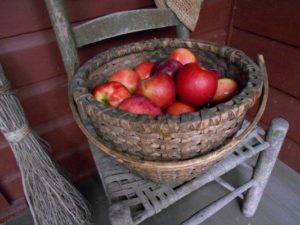-
 According to The American Table “With the exception of the wild sour crab apple, apples are not indigenous to North America. Seeds were brought to the colonies by the Puritans in the Massachusetts Bay Colony. One of the few comfort foods reminiscent of home, apples quickly grew in popularity, growing orchards from seed rather than grafting. In growing from seed, the burgeoning colonies created hundreds of unique varieties within a relatively short period of time.” Museum Educator Katherine Karlik will be talking about apples, applesauce, cider, and other interesting details about the importance of the common apple, Malus domestica, which is a member of the rose family. Applesauce Cake is the recipe of the day. The fad for this moist cake began during rationing in World War I and its popularity peaked in World War II.
According to The American Table “With the exception of the wild sour crab apple, apples are not indigenous to North America. Seeds were brought to the colonies by the Puritans in the Massachusetts Bay Colony. One of the few comfort foods reminiscent of home, apples quickly grew in popularity, growing orchards from seed rather than grafting. In growing from seed, the burgeoning colonies created hundreds of unique varieties within a relatively short period of time.” Museum Educator Katherine Karlik will be talking about apples, applesauce, cider, and other interesting details about the importance of the common apple, Malus domestica, which is a member of the rose family. Applesauce Cake is the recipe of the day. The fad for this moist cake began during rationing in World War I and its popularity peaked in World War II.
The Colonial Cookery and Customs for Kids workshop at the Wilton Historical Society teaches kids a “reciept” (recipe) used in the Connecticut region. While the food is prepared, they hear about Colonial manners, morals and way of life. The monthly workshops feature relatively simple dishes made with local, seasonal ingredients, adapted for modern kitchens. All participants will sample their own cooking and take home recipe cards – as well as any leftovers! The children will learn how a Colonial kitchen would have operated, in order to appreciate the modern conveniences we take for granted. Previous sessions have made bannock cakes, pease porridge, pickles, an amulet of green peas, apple tansey, fairy butter, pumpkin bread, cranberry shortbread, New Year’s “cakes”, New England chowder, hand pies, cheese and ramp soufflé, pea and watercress Rappahannock, blackberry maslin, thirded bread, pound cake with “Oranges” juice, maple cup custard, pepper pot soup, scalloped tomatoes, dressed macaroni and cheese, gingerbread cakes, maple syrup tart, quick pickling and Johnny cakes.
Suggested for ages 6 – 12.
Members: $10; Non-members $15. Space is limited — please register by contacting info@wiltonhistorical.org or call 203-762-7257.
Did You Know?
“The first American apple orchard was planted around 1625 by William Blackstone on Boston´s Beacon Hill. The first governor of Massachusetts Bay Colony, William Endicott, was a distinguished orchardist. Endicott´s account book noted his children had set fire to part of his operation, destroying 500 trees, a very considerable operation at that time in history. Well-known American apple orchardists include George Washington and Thomas Jefferson.” – The US Apple Association